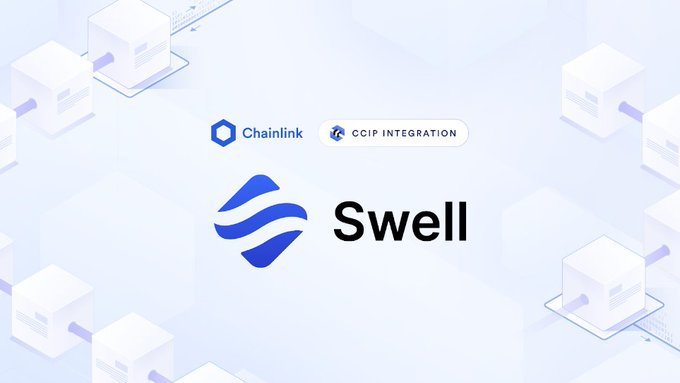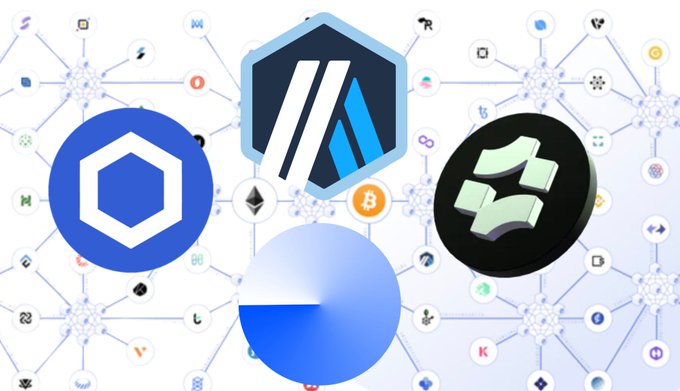Several premier institutions, including Swift, DTCC, ANZ, and Vodafone, are collaborating with Chainlink to explore the Chainlink Cross-Chain Interoperability Protocol (CCIP). The collaborations involve demonstrating secure and scalable cross-chain transfer of tokenized assets, exploring use cases that could redefine the financial industry, enabling cross-border tokenized asset purchases, and connecting IoT devices for global trade. Swell Network is integrating Chainlink CCIP to facilitate secure cross-chain token transfers for its liquid staking protocol. Chainlink CCIP provides financial institutions with the ability to transact, post data to smart contracts, capture transaction status updates, and control assets with existing infrastructure. BNP Paribas and Chainlink Labs recently discussed their collaboration using CCIP in a webinar. Nuon Finance, a Chainlink BUILD member, has integrated CCIP across multiple blockchain platforms to enable cross-chain transfers of their flatcoin, Nuon, pegged to the inflation rate.
.@swellnetworkio is integrating #Chainlink CCIP on @arbitrum and @ethereum to help power highly secure cross-chain token transfers for its liquid staking protocol. Why Swell is upgrading to exclusively using the cross-chain standard👇 swellnetwork.io/post/swell-ccip
Swell is upgrading to @Chainlink CCIP's Simplified Token Transfers on @arbitrum and @ethereum CCIP will now be Swell's exclusive cross-chain token transfer mechanism Why Swell is using #CCIP, the cross-chain standard 👇 swellnetwork.io/post/swell-ccip
Chainlink BUILD member @NuonFinance has integrated Chainlink #CCIP across @arbitrum, @BuildOnBase, and @ethereum. Nuon is using CCIP to help unlock cross-chain transfers of Nuon, a flatcoin pegged to the inflation rate as measured by @truflation.
Nuon is now securely transferable across Arbitrum, Base, and Ethereum thanks to @Chainlink’s industry-leading cross-chain interoperability solution. Made possible by the usage of Chainlink CCIP through the #ChainlinkBUILD program, the integration of CCIP’s Simplified Token
Creating a blockchain interoperability standard for the global economy requires collaborating with the world’s leading institutions. Some of the premier institutions actively exploring #Chainlink CCIP include: 1. Swift—Standard messaging network for 11K+ banks Swift and
Financial institutions don’t have to rebuild their tech stack to access the onchain economy. #Chainlink CCIP enables them to: 💱 Transact from existing systems 📩 Post data to smart contracts ℹ️ Capture transaction status updates 🏦 Control assets with existing infrastructure
Tomorrow, experts from @BNPParibas—Europe’s second-largest bank—and #Chainlink Labs will discuss their recent collaboration with Swift and 12+ of the world's largest financial institutions, which used CCIP. Register for the @Alastria_ webinar ⬇️
Chainlink SVR Expands to Five Major Blockchains Including Arbitrum and Base
Chainlink's Secure Value Recapture (SVR) oracle solution is now operational across five major blockchain networks: Arbitrum, Base, BNB Chain, Ethereum, and Hyperliquid's HyperEVM. More chains are planned for future integration. **What is SVR?** SVR enables DeFi protocols to recapture oracle extractable value (OEV) from liquidations, converting what was previously lost MEV into protocol revenue. The captured value is split between the protocol and Chainlink. **Proven Track Record** The Aave DAO recently expanded its SVR usage from 3% to 27% of its Ethereum TVL following a successful pilot. During testing, SVR liquidated at-risk positions without any bad-debt accrual, now covering major assets including AAVE, LINK, WBTC, USDC, and various wrapped ETH tokens across Aave v3 markets. DeFi protocols interested in implementing SVR can access [documentation](https://docs.chain.link/data-feeds/svr-feeds) to explore integration options.
Chainlink Acquires Atlas Order Flow Auction Protocol to Expand SVR Revenue Solution

Chainlink has acquired Atlas, an order flow auction protocol developed by FastLane. The acquisition brings Atlas under exclusive support for Chainlink's Smartly Validated Responses (SVR), described as the most widely adopted Oracle Extractable Value (OEV) recapture solution. **Key Details:** - Atlas will now exclusively support Chainlink SVR - The move aims to increase revenue for DeFi protocols by expanding SVR to new ecosystems - SVR helps protocols recapture value that would otherwise be extracted by third parties **Current Availability:** Chainlink SVR is currently live on: - Arbitrum - Base - BNB Chain - Ethereum - Hyperliquid HyperEVM Additional blockchain integrations are planned. DeFi protocols interested in implementing SVR to recapture OEV and boost revenue can reach out through [Chainlink's documentation](https://docs.chain.link/data-feeds/svr-feeds). The acquisition represents Chainlink's continued expansion of infrastructure solutions designed to help DeFi protocols capture more value from their operations.
Chainlink Launches 24/5 U.S. Equities Streams to Bring $80T Market Onchain

Chainlink has launched **24/5 U.S. Equities Streams**, enabling the ~$80 trillion U.S. equities market to move onchain. **Key developments:** - The new infrastructure provides continuous access to equity market data, operating 24 hours a day, 5 days a week - [Orderly Network](https://twitter.com/OrderlyNetwork), an omnichain perpetual DEX infrastructure, is integrating these streams to enable developers to launch secure equity perpetuals markets across multiple chains - This builds on Chainlink's track record of enabling over $24 trillion in transaction value The launch represents a significant step in bringing traditional financial markets onchain, allowing developers to build applications that bridge conventional equities with blockchain infrastructure.
Polymarket Launches 15-Minute Markets with Chainlink Integration
**Polymarket has officially launched 15-minute prediction markets** powered by Chainlink's infrastructure on Polygon mainnet. The integration combines **Chainlink Data Streams and Automation** to enable: - Near-instant market settlement - Enhanced security through defense-in-depth architecture - Support for hundreds of crypto trading pairs Starting with asset pricing, this marks the beginning of an expanded collaboration between the two platforms. UMA's existing role on Polymarket remains unchanged, with Chainlink serving as an additional infrastructure layer specifically for this new market category.
🔗 Chainlink's Vision for True Cross-Chain Interoperability
Chainlink has outlined its approach to end-to-end blockchain interoperability that extends beyond basic cross-chain token transfers. The platform addresses five critical components: - **Data integration** across different sources - **Compliance** with regulatory requirements - **Privacy** protections for sensitive information - **Legacy system integration** with existing infrastructure - **Orchestration** of complex multi-chain operations This comprehensive framework positions Chainlink as an all-in-one oracle platform capable of coordinating enterprise smart contracts across multiple blockchains and traditional systems. [Read the full technical breakdown](https://blog.chain.link/end-to-end-interoperability/)

